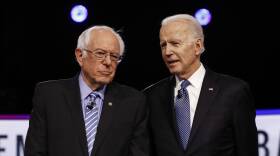EXPLORE MORE
Coming up Tuesday on BPR, live from the BPL:
"Ask the Mayor" with Michelle Wu, 12-1pm
CNN's John King
NBC Sports Boston's Trenni Casey
Recent segments
-
People Should 'Brace For The Long Haul' Regarding Coronavirus, Says Juliette Kayyem
Kayyem praised Massachusetts Governor Charlie Baker for declaring a state of emergency due to coronavirus. -
As Coronavirus Spreads Across America, Will The Democratic Candidates Change How They Campaign?
According to CNN's John King, it may depend on how the delegate lead shakes out. -
Kusnierek On Sports Cancellations Amid Coronavirus: ‘I Think It’s Smart to Wait’
The sports reporter downplayed worries about an outbreak. -
Rollins: ICE Is Making It Harder For Law Enforcement To Work With Immigrant Communities
The threat of being arrested and deported by federal authorities can discourage immigrant victims of violent crimes from coming forward, said the Suffolk County district attorney. -
Corby Kummer: Ordering Food Delivery Online Won't Protect You From Getting Sick
"Plenty of hands are touching the food that comes to you and the groceries that come to you," from online orders, food writer Corby Kummer says. -
The Revs Debate Rev. Jesse Jackson’s Endorsement Of Bernie Sanders
Irene Monroe and Emmett G. Price III discussed the two Democratic candidates’ respective endorsements, and what they indicate about underlying support.
Listen to previous shows
-

Corby Kummer: Outdoor Dining Issue Is "Bedeviling A Lot Of Cities"
Outdoor dining in Boston remains a contentious issue this year, as Mayor Michelle Wu released plans that curtail what restaurants in the North End are allowed to offer. “This is bedeviling a lot of cities,” said Corby Kummer on Boston Public Radio on Monday, citing ongoing debates in New York City about traffic and trash concerns. Last year, North End businesses were required to pay an extra fee for al fresco dining. This year’s plan limits North End businesses to outdoor space only on sidewalks, and only those of “adequate” width, according to the Boston Globe. The Globe’s Editorial Board also published a piece calling for the city to make the North End a pedestrian zone for the summer to allow North End restaurants to offer more outdoor dining on par with the rest of the city. “I think the access should be equalized for all parts,” said Kummer. "The Globe is saying one-way traffic is one thing in the summer, shut it down, make it a pedestrian zone. That’s a great idea in principle, but you try re-routing traffic when the tunnels are going to be closed for construction.” Corby Kummer is executive director of the Food and Society policy program at the Aspen Institute, a senior editor at The Atlantic and a senior lecturer at the Tufts Friedman School of Nutrition Science and Policy -

BPR Full Show 3/3/23: The Tale of Cocaine Bear
Today on Boston Public Radio, live from the Boston Public Library: South Carolina lawyer Alex Murdaugh was found for guilty of the murder of his wife and son. We opened the phone lines to hear from listeners about their thoughts on the verdict. Shirley Leung discusses Healey’s tax proposal, Wu’s plan to revitalize downtown Boston, and the new leadership at MassBio and John Hancock. Callie Crossley discusses Melvin B. Miller passing the torch over at the Bay State Banner, Brian Flores’ discrimination case against the NFL, diverse casting in Disney’s Peter Pan remake, and her excitement for the return of McDonald’s Shamrock Shake and her love for Breakfast all day. James Bennett II talks Cocaine Bear, Academy Award categories that deserve more recognition, A.R.T’s “The Wife of Willesden,” a women in cartography exhibit on the BPL, and the Celebrity Series of Boston Jazz Festival. Vincent Pastore who played “Big Pussy” on the Sopranos joins to reflect on the show before his Sopranos Q&A with a few other cast members at the Boch Shubert Theater. St. Patrick’s Celtic Sojourn peformed live for Live Music Friday this week. This included Brian and Lindsay O’Donovan, guitarist Keith Murphy and fiddle player Katie McNally. We ended the show by asking listeners if they would consider living on Life at Sea Cruises for just $30,000 a year with all expenses included. That's around the average price of living in a studio apartment in Boston but the difference is you'd be sailing all around the world. -

BPR Full Show 3/2/23: "Ask the Governor" about Shopping Carts, with Gov. Maura Healey
Today on Boston Public Radio, live from the Boston Public Library: We opened the phone lines to hear from listeners about the future of automation and what it means for their careers and livelihoods. Nancy Gertner gave us the rundown on the latest legal headlines, including the Supreme Court’s opinion on student loans, and a case on whether the Consumer Financial Protection Bureau is constitutional. Judge Gertner also reflected on a recent Texas judge’s ruling on abortion pills. Gov. Maura Healey joined live from the Boston Public Library for “Ask the Governor.” She answered questions on her new tax plan & budget, housing, Massachusetts State Police reform, transparency, the new Black Empowerment Council, plus climate & MBTA dysfunction. Alison King & Shira Stoll from NBC News talked about their series “Life, Liberty and the Pursuit of New Hampshire.” President Joe Biden and First Lady Jill Biden recently dined at The Red Hen in DC and ordered the same meal. Is this weird to order the exact same meal at a restaurant as your dining partner? We had listeners weigh in. -

BONUS: Jim and Margery’s First-Ever BPR, Feb. 25, 2013
It’s official! Jim and Margery have been on the GBH airwaves for 10 years. To celebrate their tin anniversary, we’re publishing their first-ever show as hosts of Boston Public Radio. Take a listen to see how much has changed – and how much hasn’t – with guests Rep. Stephen Lynch, political analysts Peter Kadzis and Todd Domke, Harvard’s Daniel Shrag, GBH’s Jared Bowen and culture reporter Joyce Kulhawik. An enormous thank-you to all you listeners who’ve with us over the last decade! Looking at you, John in Gardner. -

BPR Full Show 3/1/23: Are the Teachers Alright?
Today on Boston Public Radio: Reuters recently documented 220 instances of death threats and harassment against school board members. We opened the lines to hear thoughts from teachers, students, and everyone in between. Juliette Kayyem discuss her latest column on how Musk destroyed “disaster response Twitter” and clears up the facts surrounding the COVID lab leak theory. She also touched on Murdoch's acknowledgement on Fox News hosts endorsing election fraud lies. Kayyem was former assistant secretary for homeland security under President Barack Obama, and is faculty chair of the homeland-security program at Harvard’s Kennedy School of Government. For the remainder of the show, we were on tape replaying some of our favorite recent conversations with Satirist Andy Borowitz; Drag queen Nina West – also known as Andrew Levitt; Elle Simone Scott from America’s Test Kitchen and Ray Angry, keyboardist for the legendary Roots.









